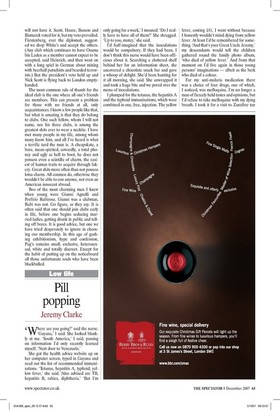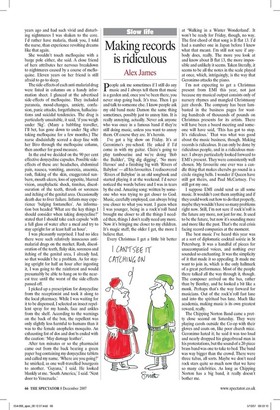Pill popping
Jeremy Clarke G Where are you going?' said the nurse. 'Guyana,' I said. She looked blankly at me. 'South America,' I said, passing on information I'd only recently learned myself. 'Next door to Venezuela.'
She got the health advice website up on her computer screen, typed in Guyana and read out the list of recommended immunisations. 'Tetanus, hepatitis A, typhoid, yellow fever,' she said. 'Also advised are TB, hepatitis B, rabies, diphtheria.' But I'm only going for a week,' I moaned. 'Do I really have to have all of them?' She shrugged. 'Up to you, matey,' she said.
I'd half-imagined that the inoculations would be compulsory. If they had been, I don't think this nurse would have been officious about it. Searching a cluttered shelf behind her for an information sheet, she uncovered a chocolate snack bar and gave a whoop of delight. She'd been hunting for it all morning, she said. She unwrapped it and took a huge bite and we pored over the menu of inoculations.
I plumped for the tetanus, the hepatitis A and the typhoid immunisations, which were combined in one, free, injection. The yellow fever, costing £41, I went without because I honestly wouldn't mind dying from yellow fever. At least I'd be remembered for something. 'And that's your Great Uncle Jeremy,' my descendants would tell the children gathered round the family photo album, 'who died of yellow fever.' And from that moment on I'd live again in those young persons' imaginations — albeit as the berk who died of a colour.
For my anti-malaria medication there was a choice of four drugs, one of which, I noticed, was mefloquine. I'm no longer a man of fiercely held tastes and opinions, but I'd refuse to take mefloquine with my dying breath. I took it for a visit to Zanzibar ten years ago and had such vivid and disturbing nightmares I was shaken to the core. I'd rather have malaria, thank you, I told the nurse, than experience revolting dreams like that again.
She wouldn't touch mefloquine with a barge pole either, she said. A close friend of hers attributes her nervous breakdown to nightmares caused by a course of mefloquine. Eleven years on her friend is still afraid to go to sleep.
The side-effects of each anti-malarial drug were listed in columns on a handy information sheet. I glanced at the advertised side-effects of mefloquine. They included paranoia, mood-changes, anxiety, confusion, panic attacks, forgetfulness, hallucinations and suicidal tendencies. The drug is particularly unsuitable, it said, 'if you weigh under 5kg'. (Many a babbling traveller, I'll bet, has gone down to under 5kg after taking mefloquine for a few months.) The nurse disdainfully scored a deep line with her Biro through the mefloquine column, then another for good measure.
In the end we decided on the 90 per cent effective doxycycline capsules. Possible sideeffects of these are: headaches, abdominal pain, nausea, vomiting, anorexia, anaemia, rash, flaking of the skin, exaggerated sunburn, mouth ulcers, loss of appetite, blurred vision, anaphylactic shock, tinnitus, discolouration of the teeth, thrush or soreness and itching of the genital area. Occasionally death due to liver failure. Infants may experience 'bulging fontanelles'. An information box headed 'What are the key things I should consider when taking doxycycline?' stated that I should take each capsule 'with a full glass of water after a meal and try to stay upright for at least half an hour'.
I was pleasantly surprised. I had no idea there were such relatively innocuous antimalarial drugs on the market. Rash, discoloration of the teeth, flaky skin, soreness and itching of the genital area, I already had, so that wouldn't be a problem. As for staying upright for half an hour after ingesting it, I was going to the rainforest and would presumably be able to hang on to the nearest tree until the worst of the side-effects passed off.
I picked up a prescription for doxycycline from the receptionist and took it along to the local pharmacy. While I was waiting for it to be dispensed, I selected an insect repellent spray for my hands, face and ankles from the shelf. According to the warnings on the back of the box, the repellent was only slightly less harmful to humans than it was to the female anopheles mosquito. An exhausting list of dos and don'ts ended with the caution: 'May damage leather'.
After ten minutes or so the pharmacist came out from the back bearing a green paper bag containing my doxycycline tablets and called my name. 'Where are you going?' he smirked, as one well-travelled bourgeois to another. 'Guyana,' I said. He looked blankly at me. 'South America,' I said. 'Next door to Venezuela.'


























































 Previous page
Previous page